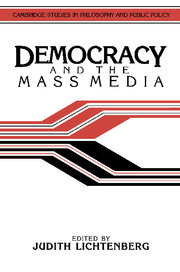Book contents
- Frontmatter
- Contents
- Preface
- List of contributors
- Introduction
- 1 Liberal constraints on private power?: reflections on the origins and rationale of access regulation
- 2 Liberalism and free speech
- 3 Foundations and limits of freedom of the press
- 4 Why the state?
- 5 Practices of toleration
- 6 Access in a post–social responsibility age
- 7 Who decides?
- 8 Four criticisms of press ethics
- 9 Political communication systems and democratic values
- 10 Mass communications policy: where we are and where we should be going
- 11 Content regulation reconsidered
- 12 The rationale of public regulation of the media
- 13 The role of a free press in strengthening democracy
- Index
3 - Foundations and limits of freedom of the press
Published online by Cambridge University Press: 05 June 2012
- Frontmatter
- Contents
- Preface
- List of contributors
- Introduction
- 1 Liberal constraints on private power?: reflections on the origins and rationale of access regulation
- 2 Liberalism and free speech
- 3 Foundations and limits of freedom of the press
- 4 Why the state?
- 5 Practices of toleration
- 6 Access in a post–social responsibility age
- 7 Who decides?
- 8 Four criticisms of press ethics
- 9 Political communication systems and democratic values
- 10 Mass communications policy: where we are and where we should be going
- 11 Content regulation reconsidered
- 12 The rationale of public regulation of the media
- 13 The role of a free press in strengthening democracy
- Index
Summary
I confess that I do not entertain that firm and complete attachment to the liberty of the press which is wont to be excited by things that are supremely good in their very nature.
Alexis de Tocqueville, Democracy in AmericaFreedom of the press is guaranteed only to those who own one.
A. J. Liebling, The PressTocqueville and Liebling notwithstanding, freedom of the press in democratic societies is a nearly unchallengeable dogma – essential, it is thought, to individual autonomy and self-expression, and an indispensable element in democracy and the attainment of truth. Both its eloquent theoreticians and its contemporary popular advocates defend freedom of speech and freedom of the press in the same stroke, with the implication that they are inseparable, probably equivalent, and equally fundamental.
At the same time, we know that the press in its most characteristic modern incarnation – mass media in mass society – works not only to enhance the flow of ideas and information but also to inhibit it. Nothing guarantees that all valuable information, ideas, theories, explanations, proposals, and points of view will find expression in the public forum. Indeed, many factors lead us to expect that they will not. The most obvious is that “mass media space-time” is a scarce commodity: Only so much news, analysis, and editorial opinion can be aired in the major channels of mass communication.
Which views get covered, and in what way, depends mainly on the economic and political structure and context of press institutions, and on the characteristics of the media themselves.
- Type
- Chapter
- Information
- Democracy and the Mass MediaA Collection of Essays, pp. 102 - 135Publisher: Cambridge University PressPrint publication year: 1990
- 28
- Cited by

